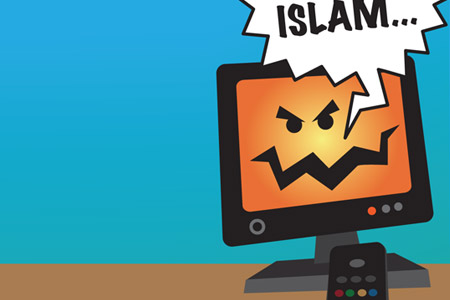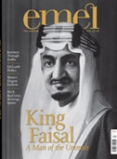
Muslims on Television
Issue 97 October 2012
There is a lot about Islam and Muslims on TV, but little of it is satisfying.
“Am I supposed to settle for bad comedy just because I’m a Muslim?”
It is clearly apparent that most instances of Muslims appearing on screen today in minority Muslim countries relate to violence, terrorism, or extremist views. I usually approach the airing of the programmes about Muslims or Islam with a mixed sense of duty and apprehension. I feel the need to be aware of what has been broadcast, but my greater sentiment is apprehension: is the programme likely to share misinformation, or worse still be a platform for stirring up prejudice and hatred? And what will the wider Muslim response be, and what impact will our reaction have on the wider discourse on Muslims?
Last month was a busy time. First was the airing of new BBC sitcom Citizen Khan, centred on the eponymous character who is a self-styled ‘komunity lider’, tight with his cash and childishly incompetent, with a long-suffering Pakistani family. I was very much looking forward to it—a rare lighthearted human portrayal of the foibles of being Muslim. But I was disappointed. It was a throwback to 1970s portrayal of Asians, and was just not very good comedy.
However, what I found baffling was that a small group of Muslims found it offensive, and made their ‘Deep Offence’ known to the broadcasting powers. Note to readers: some of the ‘Deep Offence’ was stirred up by the right wing Daily Mail because they believe that Muslims are offended by everything. What Muslims should have been offended by was the bad comedy. Am I supposed to settle for bad comedy just because I am a Muslim?
The next day, Channel 4 aired Islam: The Untold Story. Presented by historian Tom Holland, his thesis was based on his book In the Shadow of the Sword. Like Citizen Khan, the very book title was a throwback to the 70s when programmes like “The Sword of Islam” were broadcast. The programme’s crux was that instead of Islam inspiring Arabs towards initiating the great Islamic civilisation, it was the Arab empire that gave birth to Islam. The evidence used was, erm, the lack of contemporaneous evidence from Muslims, works by discredited western academics, and some Bedouins in the desert. Islam has a rigorous tradition of criticism, doubt and scholarship, and many if not most of the issues Holland raised have been dealt with in both Western and Eastern academia. Am I supposed to settle for bad Western scholarship just because I am a Muslim?
We need to learn about seeing ourselves on the silver screen, how to be active in what we see, and how to react to such portrayals—which have been pretty constant for forty years. One of the reasons is that Muslims have not been investing in and developing their own pool of cultural talent. The programming on Muslim channels, although important and constrained by limited budgets, is very basic in quality and vision. However, Muslims must understand one basic fact: to see ourselves on the national and international screen requires nurturing talent which the mainstream can draw upon. Mainstream programmes are not born in a vacuum—they come from local radio, TV, and news. Investing in Muslim arts and culture organisations today means we will see our talent on mainstream screens tomorrow.
The other thing we need to tackle is our ‘Deep Offence’ at everything. Before ‘Being Offended’, ask yourself the following question: what is the source of my offence? And then ask: what is the best way to redress this? I like the following story as a guide to how we can react. When Abraha came to destroy the Ka’ba, the Prophet’s grandfather Abdul Muttalib was part of the delegation that met him before attack. As a last request, the only thing Abdul Muttalib asked for was the return of his camels. Abraha was surprised. Abdul Muttalib replied, “I am the owner of the camels, and this House has its own Owner Who will surely protect it.” We certainly have a duty to respond to misinformation, and damaging prejudice, but we need to do so with more measured and clearer responses.Shelina is the author of Love in a Headscarf, and writes a blog at www.spirit21.co.uk
Bookmark this |
|
Add to DIGG |
|
Add to del.icio.us |
|
Stumble this |
|
Share on Facebook |
|
Share this |
|
Send to a Friend |
|
Link to this |
|
Printer Friendly |
|
Print in plain text |
|


Comments
0 Comments